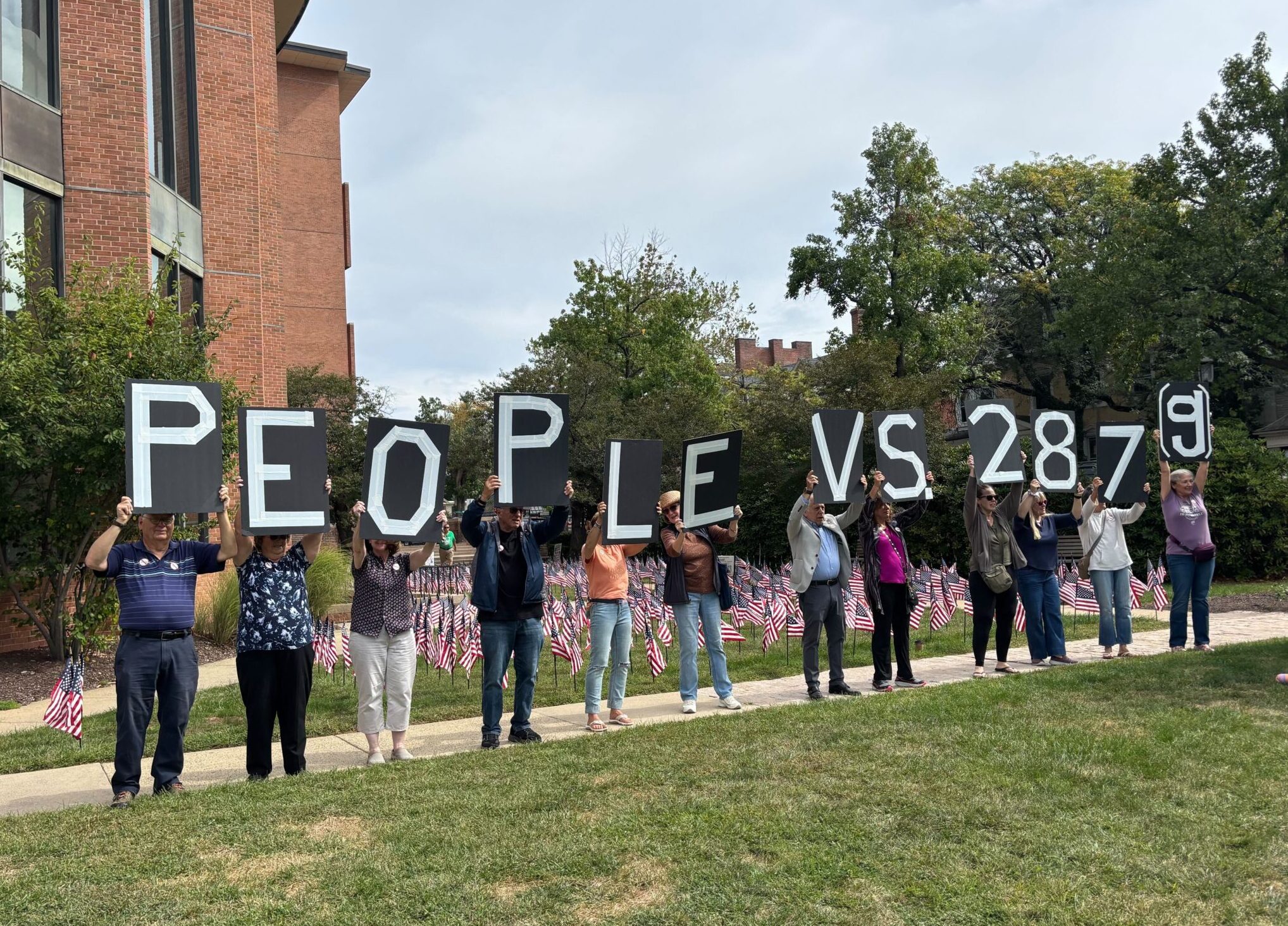Voters Ousted This Pennsylvania Sheriff After He Signed Up to Collaborate With ICE
A populous swing county replaced its GOP sheriff on Tuesday after months of controversy over his joining ICE’s 287(g) program. The Democratic winner promises he’ll end the contract.
| November 10, 2025

Update: Dan Ceisler, the Bucks County sheriff newly elected in November, confirmed at a press conference on Jan. 14, 2026, that he had terminated the county’s 287(g) contract with ICE.
Angela Staffareni, an organizer and immigrant advocate in Bucks County, Pennsylvania, became a citizen in October and promptly registered to vote for the first time. She awoke Wednesday “full of hope and happiness” because Sheriff Fred Harran, a Republican who has closely partnered with ICE, had been defeated, thanks in part to her vote.
“We finally have a little change,” Staffareni told Bolts. “I know ICE will still be here, but at least in our community we get some sense of peace. People haven’t wanted to go church, to concerts, to public events, because everybody is thinking they’re going to be taken.”
Many in this county were outraged when Harran in April signed an agreement to assist federal immigration authorities through ICE’s 287(g) program. Bucks County, north of Philadelphia, is home to some 650,000 people, roughly 1 in 9 of whom were born outside the United States.
Since Donald Trump’s return to office, local and state agencies across the country have rushed in huge numbers to aid his deportation campaign by joining 287(g), which authorizes local law enforcement officers to act as federal immigration agents. The agreement in Bucks County granted Harran’s deputies the power to question the immigration status of people they encounter and to serve and execute arrest warrants on ICE’s behalf.
Harran faced pushback from his own county’s commissioners, who argued he had no authority to sign the contract. He also faced a lawsuit from the ACLU and protests from angry residents. And his Democratic challenger, Danny Ceisler, a 33-year-old attorney and Army veteran, spoke up against the ICE partnership, putting the issue at the center of his campaign.
Ceisler defeated Harran by 11 percentage points last week, a margin of roughly 25,000 votes. He confirmed to Bolts after his victory that he intends to terminate the 287(g) agreement once he enters office.
“It makes immigrant communities afraid to call the police,” Ceisler said. “You’re talking about some of the most vulnerable members of society, who not only need to be able to call the police for their own protection, but to report crime, which affects everybody.”
Ceisler hopes officials in other parts of the country are watching. “It sends a message to elected public safety leaders across the country that partnering with ICE is a loser in any district that’s remotely a swing district,” he said.

Bucks County is about as politically competitive as can be, with Trump carrying it by 274 votes out of nearly 400,000 last fall, but on Tuesday the local Democratic Party experienced a triumphant night beyond Ceisler. Amid high turnout for a municipal cycle, Democrats also won the district attorney election for the first time since the 1960s, flipped the controller’s office, and solidified their power on local school boards that as recently as 2023 were banning books and pride flags.
Bucks County stood out this fall as a rare sheriff’s race with immigration enforcement at the forefront. Partnerships with ICE, and 287(g) agreements in particular, have been a flashpoint in sheriff’s elections since the first Trump administration. In past cycles, Democrats who have promised to end these agreements have flipped sheriff’s offices from Mecklenburg County (Charlotte) and Wake County (Raleigh), North Carolina, to Cape Cod, Massachusetts.
But that energy was largely absent this year, in part because relatively few sheriff’s offices were on the ballot across the country. (There’ll be hundreds of sheriff’s races next year, including in counties that contract with ICE.) Some GOP sheriffs who’ve helped ICE did stand for re-election this year in competitive counties but faced no Democratic opponents, frustrating immigrants’ rights advocates, including in Erie County (Buffalo), New York, and Chesapeake, Virginia.
Sign up to our newsletter
For more stories on Tuesday’s local elections
Sheriffs in Pennsylvania have limited powers compared to those in other states, so Bucks County was an unlikely host for the year’s sheriff election most defined by immigration enforcement.
In most of the rest of the country, sheriffs run jails and very often perform at least some patrol work. The 287(g) program empowers law enforcement officers to conduct tasks associated with immigration enforcement in those settings, during everyday police work or when people are booked in jail, which makes the program pipeline to deportation.
But the Bucks County sheriff’s office does not run the local jail. It also doesn’t run regular patrols, as daily police work here is conducted by 39 town and city departments. (The Trump administration has revived a 287(g) model that empowers local police to stop and question people about immigration status during patrols; no department in Bucks County participates in this program.) The office’s main responsibilities include staffing local courts, conducting evictions, serving warrants, and transporting incarcerated people to and from their court appearances.
Ceisler said the 287(g) agreement in Bucks County had the greatest potential for impact in the execution of bench warrants, more than 5,000 of which are outstanding there today.

“The reality is I can’t stop ICE itself from coming into the county,” Ceisler said. “What I can do is prevent the 17 deputies who were trained to be de facto ICE agents from doing that work.”
Immigrant advocates say Ceisler’s win is significant for reasons beyond the details of the current 287(g) arrangement.
“Harran saying he was going to collaborate was more than enough to create this fear in the community,” said Andrea Lawton, an activist originally from Guatemala, who runs a 600-member WhatsApp group in Doylestown, the seat of Bucks County.
She said that many who are vulnerable to immigration enforcement do not distinguish among local agencies. Just knowing that the sheriff’s office was involved with ICE in this way, she said, made people in her network distrustful of all police—even though the sheriff’s office is the only law enforcement agency in Bucks County currently involved in the 287(g) program.
“I don’t know anybody that has called the police since this 287(g) has passed,” Lawton told Bolts. “Because they don’t trust them. Domestic violence and labor abuse and all kinds of things are happening and nobody’s going to help.”
In part out of fear of Harran’s office, people in Lawton’s WhatsApp network have lately reported not wanting to go to work, take kids to school, or appear in court. Trump’s re-election fundamentally changed daily life in the county for many, she said, and the sheriff’s willing collaboration only heightened the concern. Lawton has been a citizen since 2006, but even she moves more carefully these days.
“We are the workforce of this county and they’ve been after all of us,” Lawton said.

“Everybody in kitchens in Doylestown are Latinos,” she added, “mostly from Guatemala, Honduras, Mexico. All the pizzerias here, all the restaurants, landscaping, cleaning, construction. People are posting on the group that they don’t want to leave their houses, they don’t want to attend activities, because they’re afraid.” She continued in Spanish, “Es un ambiente de miedo.”
Ceisler told Bolts that he has appointed Heidi Roux, former director of a local legal aid group called Immigrant Rights Action, to his transition team, and he promised to meet with affected groups as he shapes plans before being sworn into office in January.
Lawton feels encouraged by this. “One person doesn’t have all the power,” she said. “The community has to be united because things are going to continue the way they were. We’re still under the Trump administration, but at least we have hope. Just give us hope.”
Sign up and stay up-to-date
Support us
Bolts is a non-profit newsroom that relies on donations, and it takes resources to produce this work. If you appreciate our value, become a monthly donor or make a contribution.




